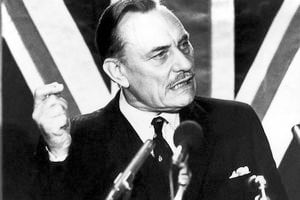Enoch Powell: Speech still divides opinion 50 years on
Historians, academics and friends remember Powell the politician

Fifty years ago today Enoch Powell delivered his incendiary Rivers of Blood speech, and time has barely reduced its ability to divide opinion.
It still ranks as one of the most famous speeches in British political history, prompting heated arguments, campaigns and protests to this day.
At the time the fallout was instant and immense.
Mr Powell, who was the MP for Wolverhampton South West, saw his ambitions for high political office destroyed as he was jettisoned from the shadow cabinet.
Protestors took to the streets in support of his call for the repatriation of immigrants, while newspaper editorials accused him of appealing to racial hatred.
A nation was divided.
More coverage from the Express & Star
Enoch Powell 50 years later: We've moved on from Rivers of Blood
Mr Powell’s April 20, 1968 address was delivered in front of an audience of Conservative members who had gathered in the Midland Hotel, Birmingham.
A few days before the speech he had told his close friend Clem Jones, then-editor of the Express & Star, that it was going to ‘go up, fizz like a rocket; but whereas all rockets fall to earth, this one is going to stay up’.
On that point at least, he was right.
The speech was timed to coincide with the Labour Government’s introduction of the Race Relations Act 1968, which essentially prohibited race discrimination on issues such as housing.
Mr Powell was vehemently opposed to the legislation, and used his speech to warn of what he believed would be the consequences of unchecked immigration from the Commonwealth.
The Rivers of Blood phrase, which never actually appears in the speech, was a reference by Classics scholar Powell to a line from the Roman poet Virgil’s Aeneid, which warned of ‘Wars, terrible wars and the Tiber foaming with much blood’.
The MP told his crowd that day that Britain’s immigration policy was like watching a nation ‘busily engaged in heaping up its own funeral pyre’.
He argued that although many immigrants wanted to integrate into communities, the majority did not, arguing that some wanted to foster racial and religious differences ‘with a view to the exercise of actual domination, first over fellow-immigrants and then over the rest of the population’.
He said: “As I look ahead I am filled with foreboding.
“Like the Roman I seem to see ‘the River Tiber foaming with much blood’.
The day after the speech, then-Prime Minister Edward Heath sacked Mr Powell from what would be his last senior political post.
However, even as he was being cast into political exile, his many supporters took to the streets in protest.
On April 23, 1,000 dockers marched on Westminster demonstrating against the victimisation of Mr Powell.
Hundreds of meat porters from Smithfield market handed in a 92-page petition supporting him.
On the Tuesday after the speech, 23,000 letters arrived at Powell’s home and the Post Office had to provide a van solely for his mail.
During the next 10 days, there were 700 telegrams and 100,000 letters, only 800 of which disagreed with him.
There were also protest marches in support of Mr Powell back on his home turf in Wolverhampton, where racial tensions that many argue had not existed before the speech suddenly came to the fore.
It was reported 1,000 of the 1,200 employees at Joseph Sankey works in Bilston signed a petition backing the former Health Secretary.
Others were angered by Mr Powell’s words.
They included students from the Wulfrun College of Further Education, who led a demonstration a week after the speech to voice their displeasure.
Dr Shirin Hirsch, a historian at the University of Wolverhampton, has explored the response to the speech in her book In The Shadow Of Powell.
She argues that there was not the level of overwhelming support for Mr Powell in the city that has often been portrayed.
“Racism certainly existed, for example with many ‘colour bars’ in Wolverhampton which blocked black immigrants entering certain pubs, but I don’t think it is taken up by politicians as a national issue in the way it later becomes,” Dr Hirsch said of the reaction at the time.
“There are existing tensions but Powell’s speech creates a political language to direct people’s anxieties towards black immigrants, at a time when the post-war consensus is breaking down.
“Powell wasn’t simply reflecting a ‘natural’ division, he was also creating a new reality.”
Others hold a different view.
Wilhelm Rose, aged 91, from Albrighton, knew Mr Powell and his wife Pamela for many years.
As a Young Conservative, she was part of the Conservative Association selection panel that picked Mr Powell as the candidate for Wolverhampton South West for the 1950 general election.
“He was a marvellous politician for the constituency and still had a lot of support after he made that speech,” she said.
“People forget that until then he was seen by many as a liberal in his views on race. He was only echoing the views of what many people in Wolverhampton held at the time.
“But I will always say that he was always fine with black people, and to this day I do not believe he was racist.
“His issue was with the number of people that were coming in, not the colour of their skin.
“That speech was the end of his political ambitions. It made him out to be something that he was not.”
Mr Powell’s first public engagement in Wolverhampton following his speech saw him attend his constituency’s Conservative Association’s annual ball at the Park Hall Hotel, where according to reports, he was greeted with lengthy applause from the 230 members present.
He continued to make speeches on immigration, but Dr Hirsch says that by the early 1970s there was a clear shift in opinion against Mr Powell and his speech as part of a mass anti-racist movement.
Depending on who you talk to, 50 years down the line the mere mention of the Powell name can still invoke either anger or admiration.





